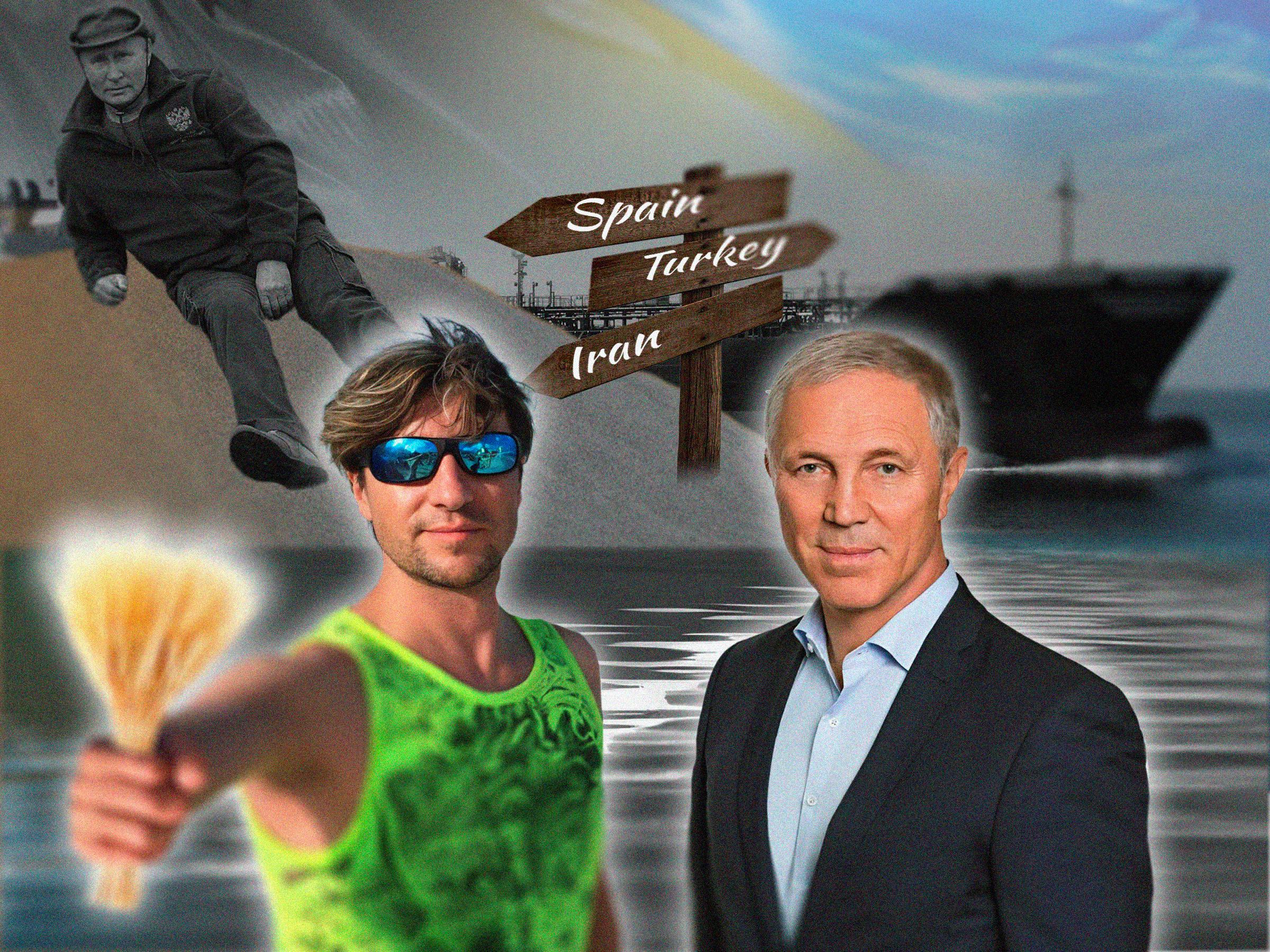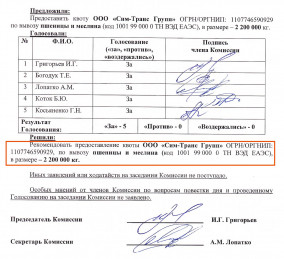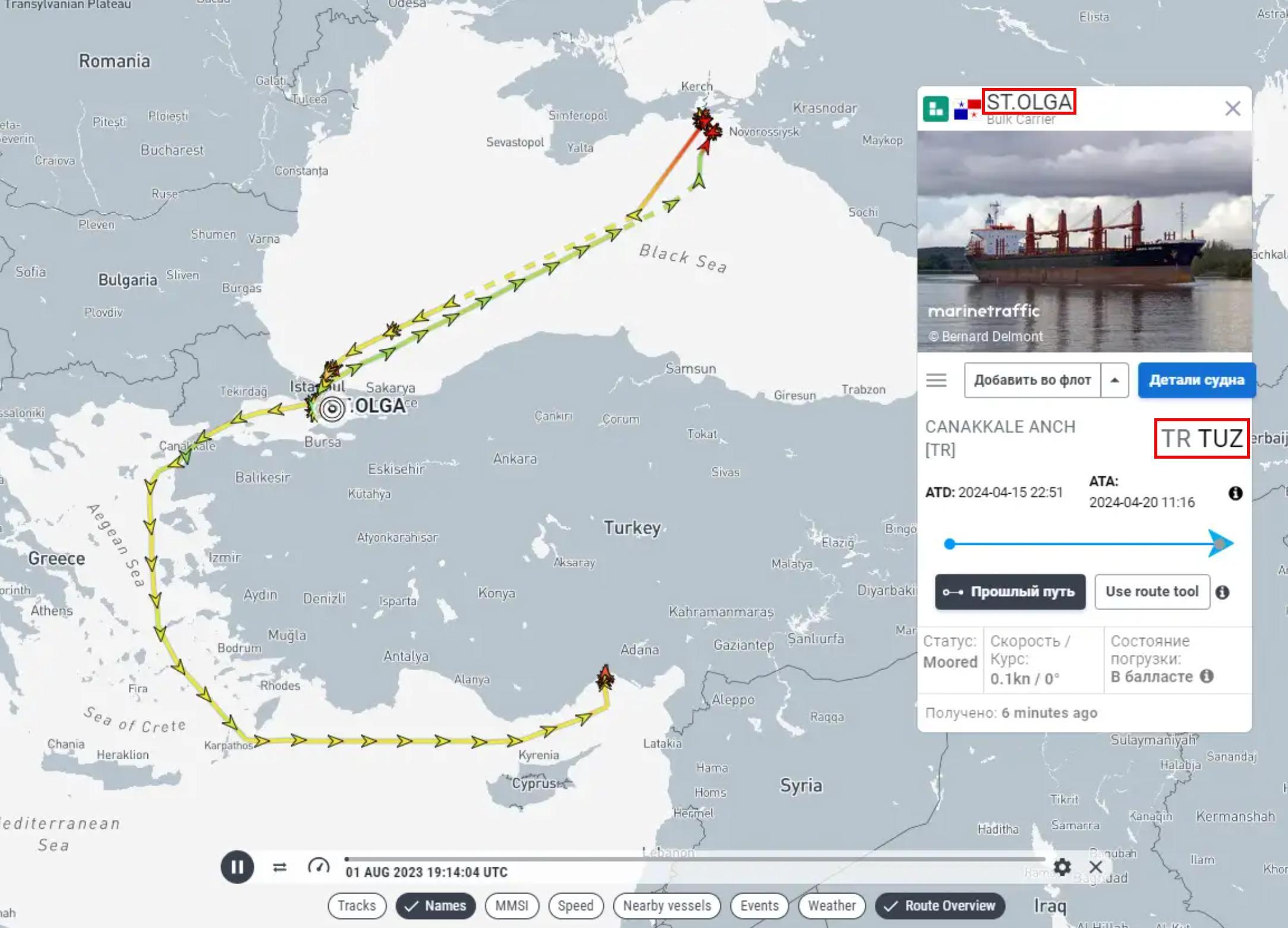The investigation was prepared in collaboration with Skhemy, an RFE/RL Ukraine project, and the Verstka publication, with the support of the Ukrainian hacker community KibOrg.
This material constitutes the initial phase of an investigation into the export of grain from the occupied territories of Ukraine. In the second part, the BIC will discuss how agricultural products reach Belarus.
The occupation of the Ukrainian breadbasket
On the last day of September 2022, in the St George’s Hall of the Grand Kremlin Palace, Vladimir Putin signed decrees annexing the occupied regions of southern and eastern Ukraine. The agreements on joining Russia were signed by the heads of the Russian administrations of the Donetsk, Luhansk, Zaporizhzhia and Kherson Regions.
The Kherson Region was represented at this ceremony by VladimirVolodymyr Saldo, a former Ukrainian politician and former mayor of Kherson. Saldo is currently cooperating with the Russian authorities and is under sanctions by Ukraine, the EU and the USA. Saldo has been in charge of the Russian-controlled part of the Kherson Region since April 2022. Saldo’s career began with his appointment as Chairman of the Russian Civil-Military Administration by the Russian occupation forces. He was subsequently appointed acting head of the administration by Vladimir Putin. In September 2023, he became the so-called Governor of the Kherson Region.
Before the Russian invasion, the Kherson Region was renowned for its advanced agricultural practices. In 2021, a year before the Russian army launched a full-scale invasion of Ukraine, local farmers achieved a remarkable feat by harvesting the largest early crop in 30 years – 3.1 million tonnes of grain. With part of the Kherson Region under occupation, the Russian authorities were able to dispose of the region’s agricultural produce by issuing permits for export and sale.
In June 2022, the General Prosecutor’s Office of Ukraine announced that the Prosecutor’s Office of the Autonomous Republic had opened an investigation “into the facts of violation by Russian ships of the procedure for entering and leaving the temporarily occupied territory of Crimea for the purpose of transporting Ukrainian grain looted by the invaders”. This process was controlled by Vladimir Saldo, according to the National Resistance Center of Ukraine.
Export quotas
“We have received an official letter from the Russian authorities stating that they have nationalised the grain elevator. We have a copy of this letter which states that all ownership of the elevator now belongs to the Russian Federation”, says Marharyta Cherepakha, co-owner of the Ukrainian OOO Novoalekseyevsky Elevator. Her company operated in the Henichesk District of the Kherson Region. [*]
Marharyta states that following the occupation, the elevator was taken over by the Russian administration, after which it was made available for use by the B-Agro company. A letter sent by B-Agro to Saldo, which has been made available to journalists, confirms that this company began managing the assets of Novoalekseevsky Elevator after the occupation.
The B-Agro company is referenced in two documents from the array obtained by journalists. This data file primarily addresses the export of agricultural products from the Kherson Region within established quotas.
This scheme was introduced three months after the annexation of four regions of Ukraine was announced. On 30 December 2022, the Government of the Russian Federation issued Resolution No. 2535, which establishes quotas (limits) for exporting agricultural products from the occupied territories with a discounted export duty. It also provides a mechanism for the export of these products.
Under the resolution, Russian companies seeking to export wheat, meslin, barley, maize, sunflower oil and sunflower meal with a zero or reduced export duty rate and sell the crops to third countries are required to contact the head of the region as per the established rules. In the case of the Kherson Region, the Commission for the Consideration of Applications for the Distribution of Tariff Quotas for Certain Types of Agricultural Products was established to distribute quotas. The commission was tasked with considering applications and voting on them. The decision must be signed by the head of the Russian administration, Vladimir Saldo.
“For EU countries, the acquisition of goods from the occupied territories of Ukraine violates the sanctions regime, which renders any trade activity related to the occupied territories impossible", states Bohdan Bernatskyi, consultant at Project Expedite Justice. "For those states that have not yet imposed sanctions on Russia, the situation is more complex and depends on the stance of each individual country".
The journalists discovered that approximately a dozen Russian companies had approached the commission and Saldo with a request to export agricultural products from Ukrainian territories at a discounted price. Numbers show that the value of agricultural products exported under such a scheme from the occupied Kherson Region in 2023 was around €6.2 million. These are shipments that have been confirmed by journalists thanks to data from the Import Genius global import and export database and information obtained from Russian customs leaks.
From occupied territories to Azerbaijan and Syria
In a statement released on its website, Russia’s OOO Sim-Trans Group announced that, “based on the results of 2021-2022, the company has become one of the three largest wheat exporters to the Republic of Azerbaijan”. In 2023, the company achieved its highest annual profit in 13 years, with a total of 22 million Russian rubles (approximately €239,000).
Documents obtained by journalists show that the Sim-Trans Group has been recommended by the Commission to be granted a quota for the export of 2,200 tonnes of wheat and meslin from the region. The buyer is the Azerbaijani company Diba. [*]
The application submitted to the Commission by the director of Sim-Trans Group includes a Eurasian Economic Union declaration. The document states that the grain to be exported was grown in the Kherson Region in 2023. The Russian export and import database confirms that in the same year, 2,200 tonnes of grain were supplied to Azerbaijani Diba at a cost of approximately 35 million Russian rubles (equivalent to €380,000).
On 4 May 2023, another Russian company, OOO TD Fregat, received an export quota of 3,000 tonnes of Kherson maize. The 3,000 tonnes were included in a shipment totalling 8,000 tonnes. The Russians gave Libya as the destination and the Kavkaz as the shipping port in the papers. [*] [*]
However, according to the SeaKrime Centre analysts, the Souria ship’s point of shipment, which appears in the documents obtained, could have been Syria.
The journalists contacted Russia’s TD Fregat and Azerbaijan’s Diba for comment, but had not heard back by the time of publication. Mikhail Builov, the director of the Sim-Trans Group, did not return phone calls.
Bound for Turkey and EU
The Russian company OOO Agro-Fregat has been referenced in Ukrainian mass media and a statement by a representative of the Ukrainian Foreign Ministry as a participant in a scheme to export grain from the occupied territories of Ukraine. In the summer of 2022, railcars bearing the designation “Agro-Fregat” were registered in the territory of Crimea, which had been annexed by Russia, at the port of Feodosia. At the time, Oleksiy Makeyev, the Ukrainian Foreign Ministry’s special representative for sanctions policy, referred to Agro-Fregat as a “seller” of stolen Ukrainian grain.
A journalist review of commission records revealed that in the summer of 2023, Agro-Fregat requested permission to transport wheat and meslin from the territory of the Kherson Region on two occasions. The first request, for 20,000 tonnes, was made on 28 June, and the second, for 5,000 tonnes, was made on 20 July. [*] [*]
The documents state that the products originate from the territory of the Kherson Region. And the commission has been in favour of this transport. According to the contract, the buyer is the Turkish company Velar Tarım Sanayi Ticaret Ltd. Şti. [*]
Using details from the “Final report on the quarantine phytosanitary condition of quarantineable products”, which includes the name of the ship, journalists were able to trace the route of the wheat from the occupied Ukrainian territory to Turkey. Agro-Fregat chartered the Alfa M ship, which, according to MarineTraffic, had been in the Sevastopol Bay since 30 July. On 7 August, Alfa M left Sevastopol with 9,553.7 tonnes of cargo on board and headed for the port of Kavkaz in the Kerch Strait. [*]
According to documents obtained by journalists from the SeaKrime Analytical Centre, the St. Olga ship entered the port of Kavkaz on 9 August, where the goods were transshipped from Alfa M. St. Olga brought wheat to the Turkish port of Mersin.
The journalists contacted the Turkish company Velar Tarım Sanayi Ticaret Ltd. Şti, but had not received a reply by the time of publication.
Investigators discovered that Agro-Fregat exported agricultural products from the Russian-occupied territories of Ukraine to not only Turkey, but also Spain, a European Union country. According to the Russian Export and Import Database, Agro-Fregat shipped 4,500 tonnes of peas to Spain in September 2023, of which 2,673.86 tonnes were loaded in occupied Sevastopol.
SeaKrime documents gave journalists more details about the shipment. Cereales Y Harinas Garsan S.L. is named as the recipient of the goods in Spain. [*]
This company has established itself as one of the largest distributors of raw materials to Spain, having commenced trading with EU countries and the Black Sea area in 2003.
The peas received by Cereales Y Harinas Garsan S.L. likely came from the Russian-occupied Crimea. The register of declarations of conformity shows that Russia's Agro-Fregat has received five declarations of conformity for peas. Three of these declarations state that the peas were grown in Crimea.
Journalists contacted Agro-Fregat and Cereales Y Harinas Garsan S.L. for comment, but at the time of publication, no responses had been received. Dmitry Lapkin, director and owner of Agro-Fregat, declined to respond to inquiries during a telephone conversation.
The Putin's Palace link
In one day in June 2023, the Commission had time to consider three applications for the export of products from the Kherson Region by the Russian company OOO Pallada. Two records on granting export quotas for 11,000 tonnes of barley relate to the execution of a contract with the Hong Kong company SPK Trading House Limited. [*]
Iran’s Bandar Imam Khomeini port was listed as the place of shipment for 24,100 tonnes of products, of which at least 11,000 tonnes were part of the granted quota. [*]
Mikhail Nenashev, the notorious carrier of stolen Ukrainian agricultural produce, was the vessel chartered to carry Kherson barley. Furthermore, the documents in the journalists’ possession corroborate the supply referenced in the Lloyd’s List Intelligence, Scripps News and Bellingcat investigation.
However, journalists found that this was not the only shipment of agricultural products from the occupied territories to Iran. Pallada has entered into a contract to supply a further 60,000 tonnes of barley (of which 4,400 tonnes were granted by quota) to Hong Kong-based Zulu Trading Limited. [*]
The bulk carriers Zaid and Zafar were chartered for this purpose. According to MarineTraffic, the ships carrying the cargo arrived at the Bandar Imam Khomeini port in Iran in late November. Pallada was registered in Rostov-on-Don just under a month before the full-scale invasion. [*]
The company immediately started to show outstanding financial results. In the first year of the full-scale war, its sales amounted to 21.5 billion Russian rubles (about €230 million) and the net profit was 1.3 billion Russian rubles. In 2023, the company saw a significant improvement in its financial performance, with revenue reaching almost 30 billion Russian rubles and net profit reaching 8 billion Russian rubles.
Sergey Kuznetsov, a Moscow resident, owns an 89% stake in the company. The individual had no previous experience or involvement in the agricultural sector. The only business Kuznetsov has been in is the rental of a wind tunnel simulator. Nor does his social media suggest that he is involved in exporting grain overseas. It is likely that Kuznetsov is only the nominal owner of Pallada, and that the company may, in fact, be working in the interests of structures linked to Croatian-born Krešimir Filipović, known in the Balkans as “Putin’s moneybag”. The link between Pallada and Filipović became evident in December 2023, when Megapolis-Invest managing company became a founding member of Pallada. From April to October 2023, Megapolis-Invest held a 92.5% stake in MKOOO Waveform Investments Ltd, which was previously 85% controlled by Filipović.
Before the full-scale war broke out, Waveform Investments Ltd was registered in Cyprus, but after the invasion of Ukraine a company of the same name was registered in the Kaliningrad offshore, a special administrative region of Russia with favourable business conditions, including for sanctioned companies. The state helped Filipović hide another Russian asset, Projekt reported in May 2024. The publication reports that since October 2023, the Unified State Register of Legal Entities has concealed the final owner of Velesstroy, which was the general contractor for the construction of Vladimir Putin’s Palace in Gelendzhik. At least as of 2022, this firm was 85% owned by Filipović. Journalists requested a comment from Sergey Kuznetsov regarding his connections with Krešimir Filipović and the export of grain. Kuznetsov read the questions but didn't answer.
A grain in the ocean
The export of approximately 30,000 tonnes of wheat, meslin, barley, and maize, which journalists were able to confirm thanks to leaked documents and verification by import-export databases, represents only a small portion of the agricultural products exported from the occupied part of Ukraine in 2023.
According to NASA Harvest, the aforementioned regions collectively yielded at least 6.4 million tonnes of wheat in the previous year. Two million tonnes, according to the SeaKrime Center, were exported through the ports of occupied Crimea. "The remaining four million are believed to be transported to Russian territory and subsequently shipped as Russian grain", suggests Kateryna Yaresko, a SeaKrime expert.
The BIC will be publishing further investigations into the amount of grain exported from Ukraine to Belarus and the companies involved.






